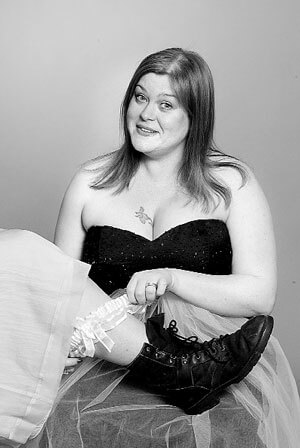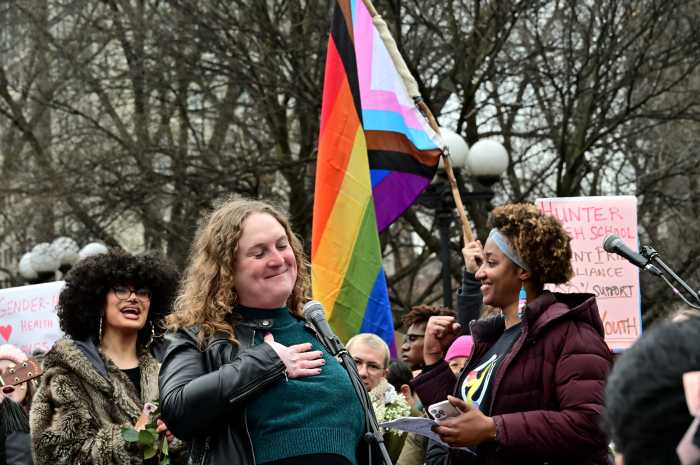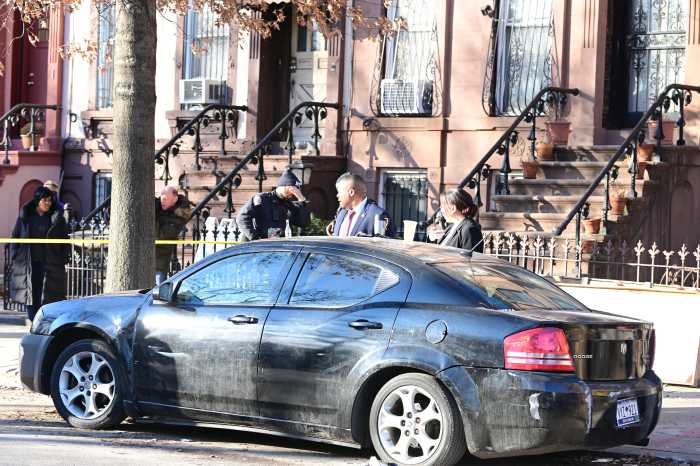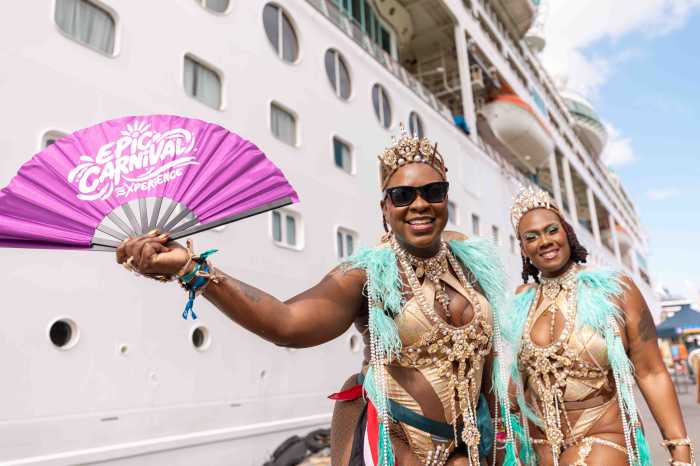Elaine St. George weds classic Broadway with same-sex love
“Marry me,” from a Kander and Ebb song, are the first words in Elaine St. George’s new musical review, “The Girl That I Marry.”
Not only are they the perfect launching pad for a show celebrating same-sex love and marriage, but they epitomize the spirit of the chanteuse who sings them. For openly lesbian St. George, her love of classic Broadway standards and her activism around gay marriage mesh seamlessly.
With her long red hair, fair skin, and operatic bearing, St. George appears very much as you would expect from a singer whose voice has been described as “a creamy, thrilling soprano startlingly akin to that of Barbara Cook.”
St. George’s trademark blend of yesterday’s music and today’s attitudes has won her praise from critics and audiences alike. And her 1998 release “Just Around the Corner” has made her a household name—at least in homes where cabaret rules.
St. George has been enamored by the music of the 30s since, as a New Jersey teenager channel surfing one night, she encountered a Busby Berkeley musical with a song she recognized as one of her father’s favorites. She was hooked, and says she spent most of her weekends up late watching old movies.
She started performing in New Jersey, but stopped singing midway through college at Smith, where she majored in theater.
“I became incredibly unhappy, and finally got a voice coach, eventually came out of my shell, and started singing where people would pay to hear me,” St. George said.
And from the beginning, when she staged her first cabaret show, “All I Need Is the Girl,” St. George has been upfront with her sexual orientation.
Asked about the inspiration for her current show, St. George recalled marching in an early Pride parade, “so long ago that we were going uptown, to Central Park. When I walked into Sheep Meadow, Judy Garland was singing ‘For Me and My Gal.’ That was when I first got the idea that this music I loved could be used to express what we’re going through.”
St. George says that in addition to wanting to secure her rights, she is prompted to marry simply because she is old-fashioned. St. George and her partner Lauren had a commitment ceremony four years ago.
“It was a lovely ceremony, but it was not really legal,” she admitted.
The two women, who both attended Smith, but did not meet there, toyed with the idea of going to Massachusetts to wed, but have decided to wait until the same-sex marriage lawsuit in New Jersey is resolved.
“What we’re doing with gay marriage is as old as time—making relationships, creating families—but what’s new for some people is the idea that gay people can create families,” St. George said. “We’re doing the same thing you people are doing, just with different plumbing.”
St. George’s style is as humorous as the T-shirt she hawks on her Web site. Inspired by the Cole Porter tune, “I Hate Men” from “Kiss Me Kate,” the shirt reads, “I don’t hate men, I just don’t date men.”
“I was putting together a show, and looking for a new song, and had heard a duet between Danny Kaye and Eve Arden in another Cole Porter musical that was ‘Let’s Talk About Love,’ and then Arden sings, ‘Let’s Not Talk About Love.’ So my musical director Paul Katz says, ‘Why don’t you sing “I Hate Men”?’ And I answered, ‘I don’t hate men, I just don’t date men.’ We both knew right then it had to end up on a T-shirt,” she recalled.
St. George brings a conscious blend of activism and humor to “The Girl That I Marry.” Her show starts with songs about love and marriage, because, as she says, “those things are universal.” It moves midstream into “Legalize My Name,” from a 40s show about African Americans in St. Louis who have sex, but don’t get married, something “which only African Americans in the 40s could do,” St. George said with a laugh, alluding to popular culture codes of the era.
“But one character wants her boyfriend to marry her, and says, ‘If you prize me, notarize me.’ And I thought of domestic partners, because you have to get that notarized,” said St. George. “So that is the initial statement I make about gay marriage. She is singing to her boyfriend, but I am singing to the government, and to society. Basically, whenever I say something activist or polemical, I try hard to say it in a funny way… If you touch someone like that through music, I think you get to them on some level.”
St. George has mastered the standards, sometimes changing the words, singing, “I need an old-fashioned lesbian love story, for an old-fashioned dyke like me,” from an Off Broadway production of “The Wild Party,” a rendition she calls “bawdy.” She sings “More I Cannot Wish You” from “Guys & Dolls,” the song her father wanted to play at her wedding.
“I love the music I sing, and one of my favorites in this show is off a 70s Alberta Hunter Broadway show, called ‘An Old-Fashioned Love,’” St. George said. “To me, that sounds fresh, and says exactly what I want to say. I suppose I could turn it into a Whitney Houston-style power ballad, but I think this music stands on its own.”
St. George says she enjoys updating music to fit her shows, describing the sound as, “not hoppy, but more modern. My music director Janice Freeman calls it hipper. I’m not singing these songs like they are museum pieces, I am singing them like they belong today.”
St. George draws the line, however, at Sondheim, saying, “I don’t take liberties… he knows what he’s doing.”
“I think there’s not anything like it out there, that combines political satire, cool music… and there’s moving bits, too,” St. George said with a smile about her repertoire.



































